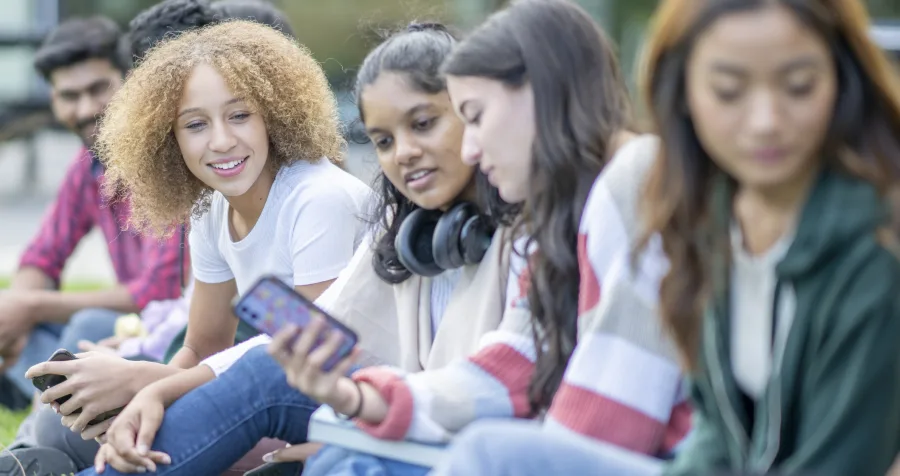How gambling is being driven by influencers

As social media continues to grow in popularity, there are increasing opportunities for new forms of advertising on these platforms. Social media advertising is nothing new and some companies use these platforms to specifically advertise to young audiences. It has been estimated that people are exposed to 5,000 advertisements per day, depending on where they live, their career, and how much time they spend online.
“When youth were asked if seeing ads on social media like YouTube, TikTok, Instagram, Snapchat and Twitch influences them to try a product or brand recommended by an influencer, 63 percent agree,” says Kristie Matte, Youth Outreach Worker with the YMCA Southwestern Ontario serving Windsor & Essex County.
What makes influencer marketing so effective is that members of the audience feel a special connection to them. Organizations pay or sponsor influencers to promote their products or services because influencers are typically relatable and share intimate moments of their life with their audience. They are seen as a trustworthy source for information and an online “friend.” However, when influencers reach a certain status and brand deals begin to emerge, they may begin to lose that authentic quality and instead begin marketing potentially risky activities to their followers for financial gain.
It’s important for youth to understand how an influencer is being paid or sponsored,” says Matte. “A lot of kids think that their favorite influencer loves the products they’re promoting and may not necessarily understand it’s a form of advertising.”
Influencer-driven marketing is an effective way to advertise to youth, yet a study in Heath Promotion International indicates there are about what activities are currently being promoted in this way. One of the most concerning activities currently being promoted via influencers is gambling – even though many social media platforms have regulations about this practice.
 Influencer marketing of gambling
Influencer marketing of gambling One of the most popular forms of gambling being promoted by influencers is the concept of “mystery boxes.” Mystery boxes are physical boxes filled with unknown items that can be purchased online.
“It’s a glorified version of a loot bag,” says Sarah Hannaford, Youth Outreach Worker for the YMCA of Greater Toronto serving Toronto East and Durham Region. Popular influencers are sent promotional mystery boxes that they ‘unbox’ on social media, typically revealing an elaborate prize like expensive shoes or high-end electronics, with sensationalized headlines like: “How I got earbuds for $4.”
Their audience (which in some cases can be millions of subscribers) can then purchase mystery boxes, sent via mail, for a chance at winning similar prizes. It is important to note that there’s no guarantee they’ll receive a prize of the same value — they may end up with a key chain or a pair of socks after spending an amount as much as $50.
Based on the Youth Gambling Awareness Program (YGAP) definition of gambling, which is risking something of value on a chance-based outcome, ordering mystery boxes is considered gambling. You are risking something of value on an outcome outside of your control.
“There are a few issues with that,” says Hannaford. “They aren’t specifying that it’s a form of gambling and they’re also glamourizing it with extravagant videos. Since they’re being sponsored to promote those brands, youth are seeing influencers get these great prizes, so they may spend money thinking they’ll get the same level of prizes.”
Social media platforms may have policies limiting gambling and sports betting ads, however, there is a big presence of gambling and sports betting content such as advice from tipsters on YouTube, Twitch and TikTok.
“You can go on to a platform like TikTok and find a number of videos with tags like ‘5 tips for betting on sports intelligently’ or ‘turn $10, into $1000 by following my sports betting strategies,’” says Sally Herod, Program Coordinator for YGAP. “Betting can be promoted to users as a skill to be learned, or a way to get rich quick, without the creator having any real responsibility or restrictions to this kind of messaging being sent out.”
What is not always being presented in these videos is that there is still real risk involved and that no tips, tricks, or knowledge of a game can ever influence a chance-based activity such as this.
Marketing and disclosure
Many social media platforms require influencers to disclose that they are being paid or sponsored to promote a product. The influencer is required to post an obvious and clear disclaimer using the #ad or #sponsored hashtag within the post, or preface the ad with a disclosure statement.
While this may help indicate that an individual is being paid to promote a product, there are few regulations that encourage influencers to communicate to their audience the potential risks with these activities.
 A different portrayal of gambling
A different portrayal of gamblingAdvertisements portray gambling as easy, fun and life-changing, rewarding, and as an opportunity to socialize. This is of concern as these motivations portray gambling as a risk-free activity to youth. Advertising often presents gambling as an alternative to hard-work and as an easy way to secure an ideal future. This belief may encourage youth to neglect other important life pursuits such as education and employment in order to pursue gambling.
Many influencers promote gambling in a fun and flashy way, yet offer minimal, if any, education on safe gambling practices or harm reduction strategies. Some popular influencers have recently come under fire for promoting gambling activities and not disclosing the potential risks to their viewers. There are also concerns about the lack of disclosure statements and misleading titles that attempt to convince their audience that these activities guarantee results and are risk-free. Influencers often have young and impressionable audiences and may not adequately explain the risk behind participating in this activity, leaving their followers without the proper information and ability to make an informed decision.
Because youth may lack the ability to understand these risks themselves and they make up the predominant demographic that watch this content, it is important for parents and guardians to have conversations with them. For example, parents can encourage understanding of what is really happening if a youth is suddenly interested in something like mystery boxes. Is it because it is being promoted by their favourite influencer on TikTok, and what exactly is being promoted?
Harm reduction and critical thinking skills
With increasing exposure to social media and influencer marketing, it is important to maintain a healthy skepticism with everything we see online and be a cautious consumer when viewing promotional content. Having conversations about sponsored content, risk, and developing critical thinking skills is an important step that parents or guardians can take with youth in order to minimize harm.
Some of the questions we should ask ourselves when viewing promotional content, including from influencers, include:
- Why is this activity/product being promoted to me?
- Does the creator have some incentive to promote this to me?
- Is the outcome they are promising likely?
- Have I ever considered this purchase before seeing this influencer promote it? What is my motivation to purchase?
- Can I afford this if it doesn’t end up in my favour?
- Does this seem too good to be true?
The YMCA of Greater Toronto’s Youth Gambling Awareness Program (YGAP) believes it is also important to discuss gambling and media together to ensure that awareness is raised, and critical thinking skills are promoted. YGAP has developed two workshops, the ‘Media impact’ and ‘Game-Bling: when gambling meets gaming.’ Both workshops are designed to raise awareness about gambling opportunities that are found in different media, such as video games and social media. The workshops promote the development of critical thinking skills necessary to analyse advertisements. Visit YGAP’s website or contact a YGAP Youth Outreach Worker in your region to book a free workshop and learn more about the topic of media and gambling.










